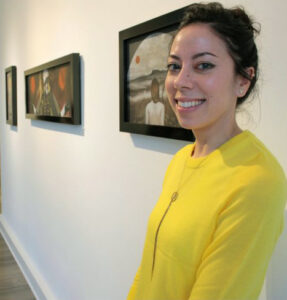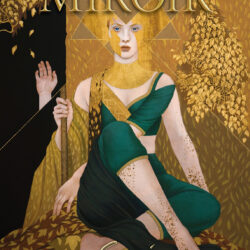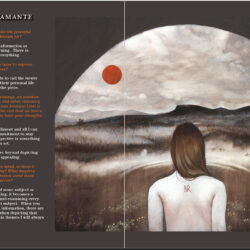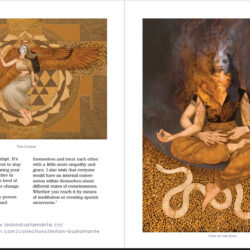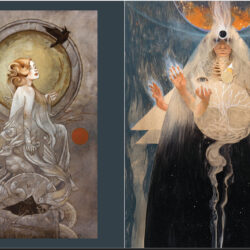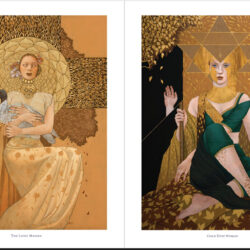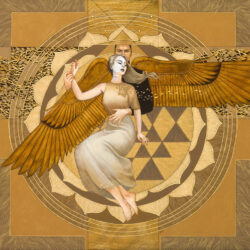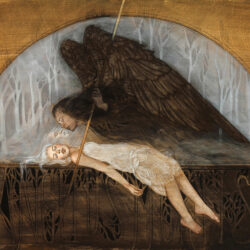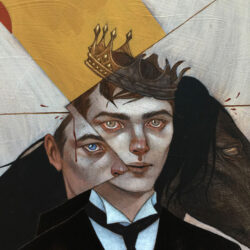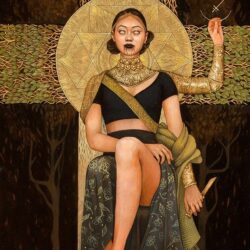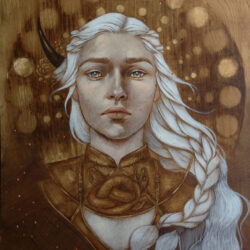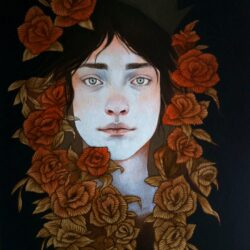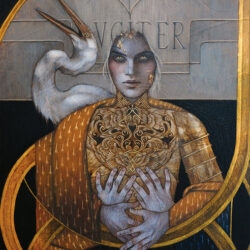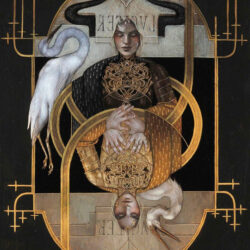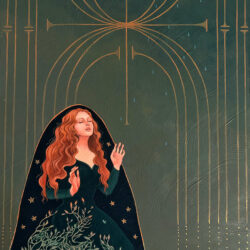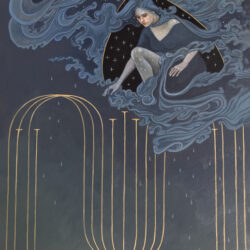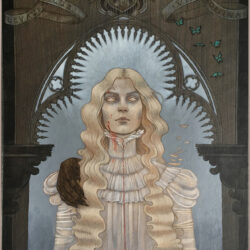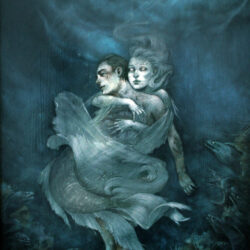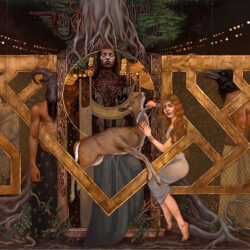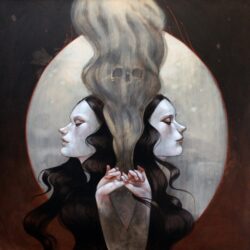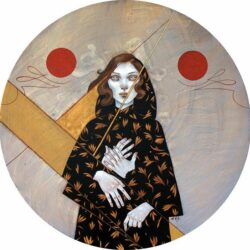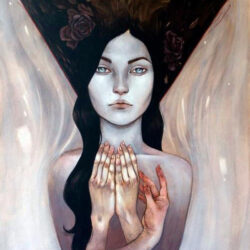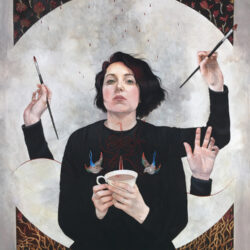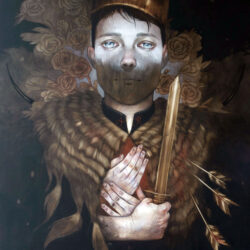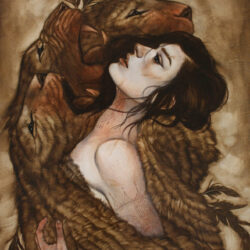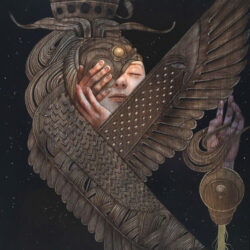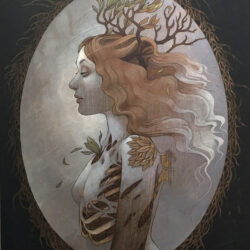Q: How are you inspired to create the powerful and compelling art you are known for?
A: I try and consume as much information as possible, and never stop learning.There is always more to learn about everything.______
Q: What does an image need to have to express or inspire a shift in awareness?
A: A big question mark. It needs to call the viewer to examine and reflect what their personal life experiences tell them about the piece.
Q: This issue is about new beginnings, an awakening, a new start. I chose you and other visionary artists for this theme of Genesis because I feel it is artists such as yourself who can lead us into a new paradigm, I would like to hear your thoughts on this.
A: That’s a very generous compliment and all I can offer is a willingness and commitment to stay curious. The shifting of perspective is something that as essential in life and in art.
As artists I think we can move beyond depicting things that are aesthetically appealing.
Q: Do you begin with a theme in mind, or does it emerge while you are working? What inspires your work… the current political conditions, the environment, the books you read, your dreams, or a conversation with a friend… In other words… does your inspiration come more from internal or external sources?
A: Both. I like research. If I find some subject or piece of information interesting, it becomes a knowledge spiral collecting and examining everything that has to do with that subject. We you collect an archive of random information, there are a lot of avenues to do down when depicting that subject. There are also certain themes I will always come back to and re-explore.
Q: Do you need to have the right environment or setting to create your art? If so, what preparations do you make to prepare the surroundings you work in?
A: I’m a clean space person so I usually like to organize all my tools before diving into a project.
Q: Due to the pandemic, and recent political upheaval (in some countries) there seems to be a need for a new perspective. A New Beginning, Rebirth, A Clean Slate, The Advent of Something Better…. Do you feel it is the artists duty to inspire change? If so in what way do you hope to make a difference in your community or the world at large?
A: I would be more comfortable saying that an artists duty is to adapt. It’s that primary commitment stay curious. I think by allowing your world view and perspective to be challenged, a certain level of self reflection will create that change.
Q: As an artist, what do you feel indicates success? Is it financial, or a good review, the inclusion in exhibitions, a solo show, publication? Does the bar continue to rise? Or do you feel that success is more internal, a confidence in your craft, a degree of self-satisfaction?
A: I think your priorities change along with your measurement of success. I try not to look at my career path as linear but more circular. There are times when my priority is financial and sometimes internal growth. As long as I continue to challenge myself and my work, the success will be in there.
Q: Do you have formal training?
A: Both. I was self taught until college where I studied Illustration.
Q: What institution did you attend? Do you feel having a degree has helped you be more successful? Did you make any lasting connections at school or find that attending formal institution gave you any advantages you might not have had otherwise?
A: I loved the illustration department there. We were really fortunate to be taught by some amazing working illustrators and the facilities were great.
Q: If you are self-taught, do you feel that the lack of formal training has hindered you in any way? Did you find any road blocks due to a lack of a degree? Do you feel there were advantages by not having a formal teacher, such as a unique perspective without other influences?
A: In terms of resources for self taught individuals now, there are very strong online art communities that were not available to me when I was teaching myself.
Q: If you had the power to change the world, to create a new beginning, what would it be, what would you change?
A: I often wish that every person would try and understand themselves and treat each other with a little more empathy and grace. I also wish that everyone would have an internal conversation within themselves about different states of consciousness. Whether you reach it by means of meditation or creating spacial awareness.
Q: What advice do you have for young artists just starting out?
A: Don’t worry so much about being successful.
Q: Do you feel that the community: local, state or government needs to be more supportive of the arts? If so, in what way?
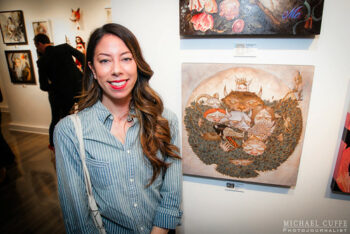 A: For sure. I think that when you nurture creativity and self expression, it will feed your own ideas and individual growth. You can apply these concepts into other areas of your life and work whether it’s by artistic means or not. It would be nice if local and state governments would put much more emphasis on that subject in school curricula.
A: For sure. I think that when you nurture creativity and self expression, it will feed your own ideas and individual growth. You can apply these concepts into other areas of your life and work whether it’s by artistic means or not. It would be nice if local and state governments would put much more emphasis on that subject in school curricula.
Q: If you could have a conversation with anyone from our past, any era, who would it be and why?
A: Rod Serling. His creation of the original Twilight Zone the mark of innovation spanning the end of the 1950’s and hurtling into the 1960’s. He brought the notion of metaphysics and other worldly consciousness to the curiosity of American audiences. Conceptually, it is some of the most poignant writing that reflected the social and political fears at the time. He held a mirror up to humanity and showed the pitfalls of a generic ideal society that was poised to climb out from one era into another.
Leilani Bustamante’s websites:
http://www.leilanibustamante.co/
https://www.moderneden.com/collections/leilani-bustamante
https://www.facebook.com/L-Bustamante-Art-151210224940091/



